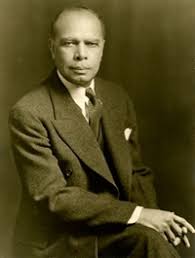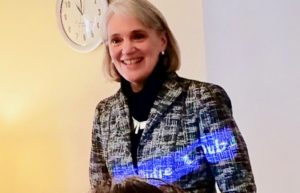 WEDNESDAY, FEBRUARY 28, 5:30 p.m. – “Through the Waters”– From Pastor Amy: God leads the people of Israel through the waters, out of slavery and into freedom. By the power of resurrection, God liberates us from slavery to sin and brings us through the waters of baptism to new life. The service begins with the Evening Prayer liturgy from ELW. Luther student Samson Masanga and member Bob Larson will read a segment of James Weldon Johnson’s poem “Let My People Go” from his God’s Trombones: Seven Negro Sermons in Verse, 1927. An electronic version of this work with original illustrations is available here (“Let My People Go” begins on page 45): http://docsouth.unc.edu/southlit/johnson/johnson.html
WEDNESDAY, FEBRUARY 28, 5:30 p.m. – “Through the Waters”– From Pastor Amy: God leads the people of Israel through the waters, out of slavery and into freedom. By the power of resurrection, God liberates us from slavery to sin and brings us through the waters of baptism to new life. The service begins with the Evening Prayer liturgy from ELW. Luther student Samson Masanga and member Bob Larson will read a segment of James Weldon Johnson’s poem “Let My People Go” from his God’s Trombones: Seven Negro Sermons in Verse, 1927. An electronic version of this work with original illustrations is available here (“Let My People Go” begins on page 45): http://docsouth.unc.edu/southlit/johnson/johnson.html
Wednesday Lenten Service, February 28, 5:30 pm – “Through the Waters”
Sermon for Sunday, February 25, 2018 – “Hoping Against Hope?”
Second Sunday in Lent
February 25, 2018
Good Shepherd Lutheran Church
Decorah, Iowa
Rev. Amy Zalk Larson
First Reading: Genesis 17:1-7, 15-16; Psalm 22:23-31; Second Reading: Romans 4:13-25; Gospel: Mark 8:31-38
Beloved of God, grace to you and peace in the name of Jesus.
So, after two weeks of Olympic coverage, how are you feeling about your own physical accomplishments? It’s inspiring to see the heights human bodies can achieve. At times, it can also make you want to throw in the towel. It’s hard enough to exercise in this college town swarming with the bodies of fit twenty-year olds – thank you very much!
That sense of inferiority can happen in our faith lives, too. Can we ever measure up to the great heroes of faith like Abraham and Paul, Dorothy Day, Bonhoeffer, Dr. King? They definitely knew what it was to carry their cross and give of themselves freely.
Today we heard a lot about Abraham in the first and second readings. The way Paul describes him in the Romans passage, Abraham sounds like a truly stellar spiritual athlete.
Paul writes: “Hoping against hope Abraham believed that he would become the father of many nations.” “He did not weaken in faith when he considered his own body which was as good as dead or the barrenness of Sarah’s womb.” “No distrust made him waver” and he was “fully convinced” that God would bring him a son. This guy should get a gold medal for faith.
Except, with all due respect to the Apostle Paul, his memory of Abraham seems a bit … selective. A cynic might even claim Paul is like some election year spin doctor who’s sanitized Abraham, air- brushed him, made him look spotless and spiritually splendid. Paul does have good reasons for his portrayal of Abraham. He emphasizes Abraham’s faith to teach that faith is more important than good works – a key thing to remember. Yet Abraham’s faith is a bit more complicated than Paul lets on which, it turns out, is good news for us.
The first time God promised a son to Abraham, then called Abram, he believed God. It “was reckoned to him as righteousness.” But when some years passed and a son still hadn’t been born, Sarai and Abram took matters into their own hands.
Sarai decided her slave Hagar, rather than God, would produce a son. Abram, we’re told, “listened to the voice of Sarai”. It’s not clear if he listened to the voice of the Lord about this. He embraced Sarai’s plan- literally- and a son Ishmael was born. Slaves did bear children for their mistresses, so maybe this plan wasn’t a lack of faith. But it still seems a little sketchy; and the way Abram and Sarai treated Hagar was really awful.
God promised Abram a son again, and gave him the name Abraham, ancestor of many nations. This time God promised the son would come through the renamed Sarah. But, once again, Abraham was anything BUT fully convinced. “He fell on his face and laughed, and said to himself, ‘can a child be born to a man who is a hundred years old? Can Sarah, who is ninety years old, bear a child?’ ” It seems some distrust did make him waver a bit.
We really need this more nuanced picture of Abraham alongside Paul’s version. Because if we see Abraham merely as a larger than life hero of faith, we may get the wrong impression about God. We might conclude that God works only with spiritual giants of Olympian strength – muscular Christians – and despair that God can work with garden-variety humans like us, who are a little more weak and wavering.
Abraham doubted plenty. He struggled, took matters into his own hands, and laughed in disbelief. He also tried to pass Sarah off as his sister twice in order to save his own skin. I think you should lose style points for stunts like that.
Yet, God still did a new thing in Abraham and Sarah. God made them a promise. That promise work- ed its way into their lives and bore fruit. Their son was born and a whole new faith was born. Sarah and Abraham became the forebearers of the Jewish and Christian faiths. According to Genesis, God also made promises to Hagar and Ishmael and their descendants in faith, that is Muslims. Because of God’s promises, each of these ancestors was a blessing to the world.
God’s promise brought new life and new faith. Abraham became fully convinced, not because of some heroic ability on his part, but because of the power of God who gave the promise.
God’s promises aren’t the empty words of a spin doctor or campaign specialist. God, as Paul says, “brings life to the dead and calls into existence the things that do not exist.” God’s promise, God’s Word, makes things happen. God’s Word calls creation into existence, rips open the heavens, raises the dead and brings new life.
God’s Word also creates faith and hope – in Abraham and in us.
It doesn’t depend upon us to muster up faith. It doesn’t fall to us to bring about change and newness on our own. God’s Word creates the hope we need, the hope our world needs.
God’s Word of promise is given to you – in the covenant of baptism and in worship today through scripture, song, prayer, preaching, and Holy Communion. God’s Word is at work to forgive you, to set you free, to give you new life – each new day.
In all the times you feel like throwing in the towel, in all the ways you think you don’t measure up, in all your cynical laughter or despair about the state of the world and your own life – God’s word is for you. You don’t need to worry about saving and securing your life; you have what you need to let go and follow Jesus into the unknown.
You have what you need to hope and risk and start again, and to be a blessing for our world. See, this promise is for you, but not only for you. The world needs people who can hope against hope, who remain open to new life, who freely give of themselves.
As God’s people together, as children of the covenant, we can do this. Not because we are heroic but because God is faithful.
Let’s take a moment for prayer and reflection.
This Week at Good Shepherd, February 26-March 4, 2018
 Tuesday, February 27
Tuesday, February 27
7:00 p.m. – CLA Circle – Judy Schoel hosts
7:00 p.m. – Building Committee
Wednesday, February 28
7:30 a.m. – Men’s Breakfast
5:30 p.m. – Midweek Lenten Service – Soup Supper following
7:00 p.m. – Choir Practice
8:00 p.m. – Band Rehearsal
Thursday, March 1
10:00 a.m. – Bible Study with Pastor Amy – Narthex
5:30 p.m. – Community Meal at First Lutheran
Friday, March 2 – WORLD DAY OF PRAYER
Sunday, March 4 – Third Sunday in Lent
8:45 a.m. – Choir Warmup
9:30 a.m. – Worship with Holy Communion – Broadcast 11:00 a.m.
10:30 a.m. – Fellowship Hour
10:45 a.m. – Sunday School and Youth Forum
10:50 a.m. – Adult Forum – “Immigration. Got Questions? We’ve Got Answers.”
Adult Forum, Sunday, February 25, 2018 – “Faith and Stories” Series
 10:50 a.m. — Adult Forum: The “Faith and Stories” Series concludes with the discussion of Oscar Hijuelos’ story “Christmas 1967” from his novel Mr. Ives’ Christmas. President Paula Carlson returns to lead the discussion. Copies of the story are available on the Narthex Table for those planning to participate in the Forum. The story is published in Volume 3 of the “Listening for God” series co-edited by Dr. Carlson, available from Augsburg Fortress and through Amazon.
10:50 a.m. — Adult Forum: The “Faith and Stories” Series concludes with the discussion of Oscar Hijuelos’ story “Christmas 1967” from his novel Mr. Ives’ Christmas. President Paula Carlson returns to lead the discussion. Copies of the story are available on the Narthex Table for those planning to participate in the Forum. The story is published in Volume 3 of the “Listening for God” series co-edited by Dr. Carlson, available from Augsburg Fortress and through Amazon.
Oscar Hijuelos
Paula Carlson Presenting at Good Shepherd Adult Forum
Wednesday Lenten Service, February 21, 5:30 pm – “In the Beginning”
 WEDNESDAY, FEBRUARY 21, 5:30 p.m. – “In the Beginning” – From Pastor Amy – Just as the creator God forms the earth out of chaotic waters and shines light onto primeval darkness, so too, our baptism into Christ’s resurrection pulls us from death into fruitful life with all the good earth and enlightens our life in Christ. The service begins with the Evening Prayer liturgy from ELW. Luther students Katy Roets and Diamond Jenkins will read James Weldon Johnson’s poem “The Creation” from his “God’s Trombones: Seven Negro Sermons in Verse,” 1927. An electronic version of this work with original illustrations is available here (“The Creation” begins on page 17): http://docsouth.unc.edu/
WEDNESDAY, FEBRUARY 21, 5:30 p.m. – “In the Beginning” – From Pastor Amy – Just as the creator God forms the earth out of chaotic waters and shines light onto primeval darkness, so too, our baptism into Christ’s resurrection pulls us from death into fruitful life with all the good earth and enlightens our life in Christ. The service begins with the Evening Prayer liturgy from ELW. Luther students Katy Roets and Diamond Jenkins will read James Weldon Johnson’s poem “The Creation” from his “God’s Trombones: Seven Negro Sermons in Verse,” 1927. An electronic version of this work with original illustrations is available here (“The Creation” begins on page 17): http://docsouth.unc.edu/
 A Simple Soup Supper, provided and served by members, follows the service.
A Simple Soup Supper, provided and served by members, follows the service.




